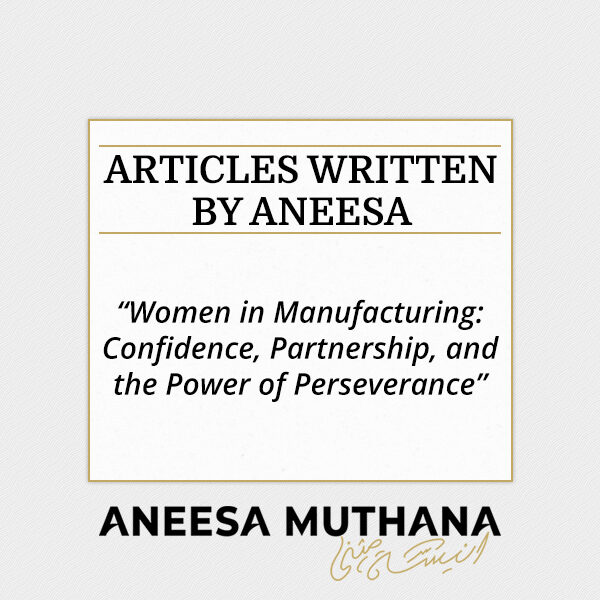Leadership: Letting the Results Speak for Themselves
I am a CEO and leader in manufacturing. I also happen to be a woman.
It might make sense, then, to be likewise proud of being a “woman CEO” in manufacturing.
Yet like Ashley Sumner and many others, I’m more than ready to snip “woman” from my oft-mentioned identity as “woman CEO in manufacturing.”
It’s well-intentioned, no doubt, but it’s outlived its usefulness. The main argument for continuing the practice might be to showcase successful women to other up-and-coming women. Twenty years ago, when women leaders were still a relative rarity, this made more sense.
Although we’re still a minority, we’re a larger one. I can think of no better way to inspire other women than to show how we stand among men. We only truly belong when our accomplishments outweigh our chromosomes.
Not all women agree. I recently expressed support for a like-minded colleague on social media. In response to my post, an acquaintance contacted me to share her concerns about this trend. I’ll call her Becky.
To paraphrase Becky’s concern about gender and social identity: we’re conflating where we are today with what we want in the future. Becky knows that women succeed due to hard work and passion, but believes they still need to work harder than their male counterparts to find the same level of success.
I choose to let the results speak for themselves.
To this, I say: I understand. I hear you. I’ve lived it. But after nearly 30 years, my tactics have changed, and I choose to respond to this issue differently. I choose to let the results speak for themselves.
Sexism still exists. Only a fool would claim otherwise. I advocate for women in manufacturing because we’re not yet in a place where gender is irrelevant. Crossing out the “woman” represents a small but notable milestone on that path. It’s a reminder of our goal, not a victory declaration.

Life is unjust. Everyone has challenges. Yes, some have more than others, but advocating for women has never been about keeping score. If I bothered to do so, I might tally twice as a Muslim woman. Maybe add another because I’m first-generation Yemeni. I’m grateful to be all of these things but they aren’t major players in my success. I rose to CEO the way anyone should: sweat, insistence on quality, and a dash of stubbornness. I’ve made some mistakes along the way, not because I’m a woman, but because that’s what it takes to get better!
As a leader, I’m hesitant to present myself as a “female CEO” because it places gender ahead of other, more critical considerations. My gender (and religion) is in plain sight. My team cares far less about my womanhood than my ability to take care of them, my empathy, my willingness to get their backs when it matters most.
Gender has no bearing on my ability to lead my team, nor should it.
Women are, of course, entirely capable of doing any and all of these things, but because of their life experiences and choices, not because they’re women. Gender has no bearing on my ability to lead my team, nor should it.
Becky had another concern: if we’re so concerned about DEI, shouldn’t we hold companies accountable for being willing to celebrate our differences? If we can’t be authentic to our identity, how are we advancing the cause of DEI?
This concern compels me to respond because I’ve spent most of the past decade pushing for DEI. No one should be afraid to acknowledge how they are different or feel marginalized because of those differences. However, I know of several companies that practice diverse hiring, but have few if any formal recognition initiatives, much less a person or team devoted to DEI. In fact, mine is one such company! Though we’re active in outreach efforts to women, we have no formal policy in place to applaud different backgrounds.
If someone prefers to work for a company that actively applauds different backgrounds, that’s well and good! Still, I would advise resisting the urge to paint those companies as indifferent to DEI, or even as oppressors. Not every company has resources to devote to outreach, and I often hear their leaders say things like, “We’ll hire anyone, we just want qualified people.”
Could they do more to make their company more welcoming to women and other minority groups? Possibly, but I choose to spend my energy inspiring other women, rather than calling out every company, project, or person that doesn’t meet my standards of DEI.
Part of living in the land of opportunity also means accepting different opinions and I realize that not everyone will agree with me. I’m glad for it because it gives us an opportunity to listen and learn from each other. I’m grateful to Becky for having the courage to come forward and engage me in civil discussion of our differences and—as it turns out—our similarities.
For those that still disagree, that’s well and good! I respect your opinion. All I ask in return is for you to respect mine.













